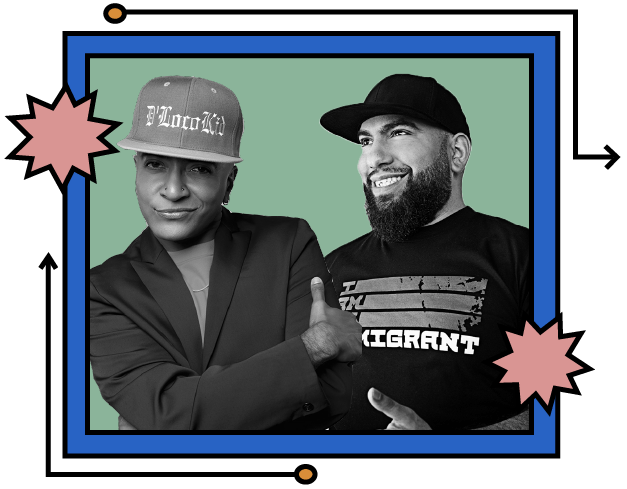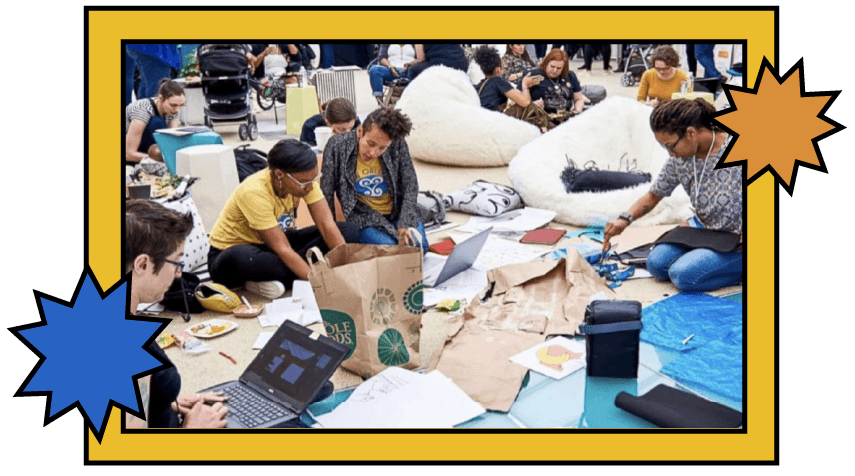

MODULE 1: SELF-CARE PODCAST
While it’s seems to have been boiled down to bubble baths and affirmations in the mainstream, self-care has always held a deeper and more political meaning with many BIPOC, particularly activists and civic media makers, who call out white supremacist, capitalist and patriarchial institutions and systems.
For civic media makers, many of whom are holding together the realities of what it means to manage one’s multiple selves (i.e., as an artist-activist-educator-etc.), navigate being a public and highly visible brand, and survive in hustle, grind and burnout cultures, self-care is acutely necessary to ensure that individual care trickles down to a larger community of care. In this podcast, we talk critically with transgender actor and comedian D’Lo and deisgner and cultural architect Daniel Leon-Davis about where civic media, self-care and the pandemic intersect and how the practice of nurturing your creative spark improves mental health.
![]()
For civic media makers, many of whom are holding together the realities of what it means to manage one’s multiple selves (i.e., as an artist-activist-educator-etc.), navigate being a public and highly visible brand, and survive in hustle, grind and burnout cultures, self-care is acutely necessary to ensure that individual care trickles down to a larger community of care. In this podcast, we talk critically with transgender actor and comedian D’Lo and deisgner and cultural architect Daniel Leon-Davis about where civic media, self-care and the pandemic intersect and how the practice of nurturing your creative spark improves mental health.


MODULE 2: COLLABORATION
The Civic Media Fellows engage in collaboration with other artists, organizers and community members within their creative process. Some of them approach their work as an ongoing dialogue with members of their community about issues that matter to them. Others continually seek out collaborative partners for specific projects in which they need artists operating in different mediums. Terry Marshall, one of the fellows whose work is highlighted in greater depth in the Creating Futures section, also highlights collaboration as a process of creating networks that allow creators to remain small and agile. Instead of large institution building, he highlights the benefit of remaining flexible, quick and network-based. Within that framework, collaboration is ingrained in the process of how he sees the value of projects. For the fellows, collaboration not only results in new, multimedia projects, but also creative formations that enable sustained work for the purpose of communal action.
![]()


MODULE 3: CREATING FUTURES
The Civic Media Fellows recognize that imagining is critical to build a better world and that social change is largely impossible without the ability to collectively conceptualize what the future can look like. Just as it is vital to organize to dismantle systems of oppression, it is necessary to be able to have a vision for what comes next. For this reason, many of the fellows create immersive experiences that allow people to enter into futuristic worlds or draw from the storyworlds of popular culture in order to engage peoples’ imagination and capability to dream. Some conduct workshops that allow participants to create objects from future worlds they would like to see, engaging in new forms of creation and collaboration. Drawing from traditions like black liberation and intersectional feminism, the fellows understand that building narratives and collective worldbuilding is essential to the process of working with communities for social change.
![]()


MODULE 4: STORYTELLING
Many of the Civic Media Fellows see themselves as storytellers who work to cultivate dialogue, empathy and communal action through the use of compelling narratives. They work with community members in order to chart the histories of cities, movements, and acts of resilience in the midst of systemic oppression, and they push the boundaries of technological tools and media in order to provide narrative experiences that are interactive and immersive. The fellows also recognize the importance of situating storytelling within longer lineages of communal struggles for social justice. They understand that archives are living and continuously evolving, and they create methods for communities to engage with and contribute to dynamic archival practices. In some cases, this also means considering spaces as primary documents and understanding the intersection between storytelling and spacemaking.
![]()


MODULE 5: LEGACIES OF CHANGE PODCAST
How do you sustain and grow your activism? What does it mean to be coming from a longer tradition and history that will continue beyond yourself? How are you recognizing the past and seeing how you fit in the present, to build towards the future?
We talked to community organizer and cultural engineer Fresco Steez, former Minister of Culture at BYP100 and digital strategist for the Movement for Black Lives, to speak to these questions and explore what she considers her political foundations, lessons and what she wants her legacy to look like.
![]()
We talked to community organizer and cultural engineer Fresco Steez, former Minister of Culture at BYP100 and digital strategist for the Movement for Black Lives, to speak to these questions and explore what she considers her political foundations, lessons and what she wants her legacy to look like.

